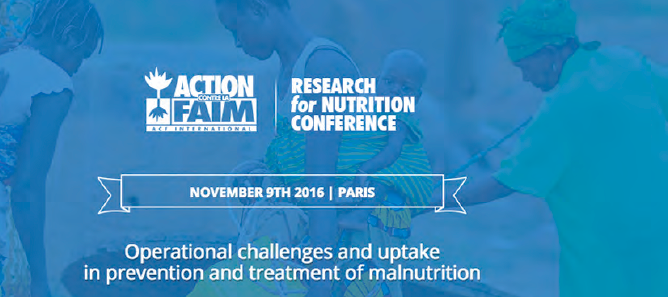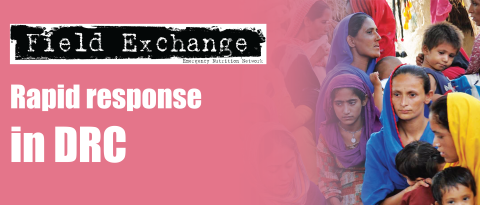Special Section: Research for Nutrition Conference - Editorial
 Myriam Ait Aissa leads the Action Against Hunger Research and Analyses Department, which overall aim is to produce evidence for better action. Before joining Action Against Hunger, she worked for the Scientific Department of ACTA International, a French applied agricultural research institute, as a research fellow. Her work focused on nutrition and food security research areas.
Myriam Ait Aissa leads the Action Against Hunger Research and Analyses Department, which overall aim is to produce evidence for better action. Before joining Action Against Hunger, she worked for the Scientific Department of ACTA International, a French applied agricultural research institute, as a research fellow. Her work focused on nutrition and food security research areas.
The second Lancet series on undernutrition was a key milestone in the global call for more robust evidence on nutrition sensitive interventions (Lancet, 2013). Academics, non-governmental organisations, national stakeholders and donors have been increasingly involved in operational research to improve the effectiveness of a set of multi-sectoral interventions for better prevention and/or treatment of undernutrition. Donors and policy-makers regularly reaffirm their needs for more robust results to orient their policies. This has led to a significant increase in research concerned with humanitarian nutrition programming and policies in crises settings (Blanchet, 2015) While channels to publish or communicate results exist, they offer limited space for sharing learning on process implementation and research uptake by relevant stakeholders. There is no specific space dedicated to the presentation of scientific results on nutrition in humanitarian settings.
To help fill this gap, Action Contre la Faim (ACF) recently organised an international conference entitled ‘Research for nutrition - operational challenges and research uptake in prevention and treatment of undernutrition’, hosted in Paris on November 9th 2016. ACFs longstanding experience in programming and operational research in humanitarian settings, active research portfolio on malnutrition prevention and treatment, and openness to share challenges as well as successes, meant we were well placed to convene this gathering. The conference had two main objectives: to present a selection of the latest research related to the identification of effective nutrition specific and sensitive interventions in crises contexts, and to provide a space for discussion and debate about nutrition research methodological design and uptake challenges. Almost 200 individuals participated, with 12 international universities, 16 international non-governmental organisations (INGOS) and seven donors among those represented.
Two panel debates explored operational research challenges and research uptake considerations; proceedings are summarised in this issue of Field Exchange. In both sessions, panellists and plenary participants explored common experiences and themes. Research shared in presentations spoke to key evidence gaps the international community is working on, in particular:
- Impact of cash transfers on undernutrition: In recent years, a set of robust studies were launched to assess the effects of cash transfers on nutrition. Preliminary results of two randomised controlled trials assessing the effects of cash transfers on wasting in Burkina Faso and Pakistan were presented.
- Anthropometric assessment of undernutrition: A significant area of research interest is to identify nutritional vulnerability in children, including but not limited to anthropometric indicators. One study explored identification of wasting, and outcomes amongst infants under six months of age in Bangladesh; a second investigated the association of mortality risk with different anthropometric measures.
- Impact of water, sanitation and hygiene (WASH) activities on undernutrition: A recent movement, “Wash In Nut’,” aims to orientate WASH programmes to improve nutrition treatment and prevention outcomes. Evidence of the effects of such strategies on nutrition are still missing. The results of two fascinating randomised controlled trials in Chad were presented.
- Health service delivery models for acute malnutrition: There has been recent drive and a number of initiatives to strengthen malnutrition treatment services within health systems, at national and local levels and within communities. Two approaches being researched were presented from Burkina Faso and Mali. Of particular note, research on characterisation of MAM in Burkina Faso should allow for better future treatment strategies.
A selection of the presentations is summarised in this special section of Field Exchange 54; headlines and key contacts are provided for study results not yet available.
Feedback on the conference was extremely positive, reaffirming the importance and relevance of having dedicated time and space for researchers, practitioners and donors to exchange, discuss and reinforce collaboration on a spectrum of nutrition research with a strong operational focus. ACF is already preparing for a second conference in 2017, with a view to this becoming an annual event to share, think and innovate around nutrition research in humanitarian settings.
For more information, contact: Myriam Aissa, email: maitaissa@actioncontrelafaim.org
To view video footage of the day here.
References
Blanchet, K et al (2015). An evidence review of research on health interventions in humanitarian crises. LSHTM, Harvard School of Public Health, ODI. Commissioned by ELHRA. Technical report. October 2013. www.elrha.org/wp-content/uploads/2015/01/Evidence-Review-22.10.15.pdf
Ruel, M et al (2013). Nutrition-sensitive interventions and programmes: how can they help to accelerate progress in improving maternal and child nutrition? Lancet 2013; 382: 536-51


